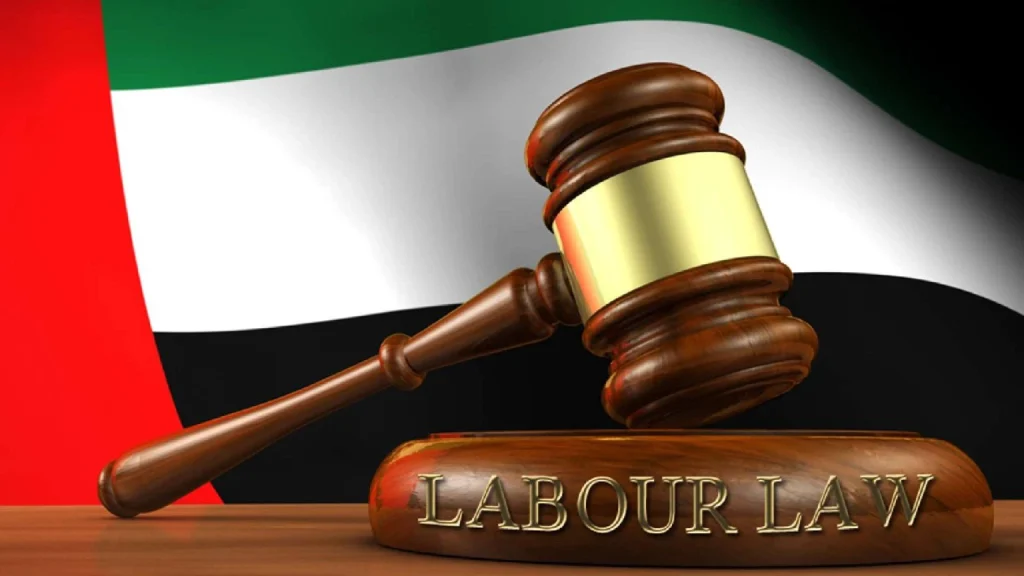The UAE today is the center of hearts for international trade and industry development on a global scale. This is done through its strategic advantage, ample economic resources, and also its strong judicial system. A key element of the legal framework of the workforce is the UAE Labour Law. Composed of many legal norms regulating relationships at the workplace of the private sector in the UAE.
In this article, we will analyze the features of the UAE Labour Law. Reflecting on its importance and the advantages it brings for employers and employees. Furthermore, we will scrutinize pivotal elements in the law, most recent developments, and tools to traverse through the complications. This detailed article is for you. Either you are an employer or an employee and you want to understand your obligations and rights.
What is UAE labour law?

The Labour Law signifies the rights and the duties of employers and employees in the UAE. The legislation guarantees equity and unity in labor-employer relations of the country. Consequently, employees guarantee their roles by protecting their rights and the obligations to the relevant parties.
The supervision and implementation of the Labour Law is an obligation of the Ministry of Human Resources & Emiratisation (MOHRE). The core principles of the new UAE Labour Law include:
- Standard workweek: Normally, the workweek consists of 48 hours. Reaching a maximum of eight hours per day (including 6 days per week). Overtime is legal along with the restriction of total hours and other special charges.
- Paid leave: The company ensures that employees receive the necessary paid annual leave, sick leave, and other mandatory types of leaves. However, they can be different due to a number of factors such as the kind of work and the nationality.
- End-of-service gratuity: Upon the UAE labour law resignation of a contract, employees have the right to opt for gratuity package from their employer/s. UAE labour law gratuity takes into consideration such aspects as the employee’s salary and number of years they served.
- Non-discrimination: The legislation does not permit discrimination against the employee on the base of such factors. For instance, race, religion, gender or nationality, etc.
Benefits of UAE Labour law
The UAE Labour Law 2024 is an important area of interest to employers and employees alike. As they both stand to gain from its stipulations. These benefits are essential for employee welfare, and they also support a level playing field.
- The employers must be aware of the benefits provided by the work regulation implemented by the UAE Labour Law. Also, they must ensure that these stipulations shall not be violated. This encompasses paying employees stipulated minimum wage, timely issuing of pay and compliance with leave entitlements and gratuity upon UAE labour law termination.
- Furthermore, employers who emphasize their commitment to labour law compliance and offer competitive benefits packages stand a better chance of getting professionals workers. As well as retaining a motivated and inspired staff.
- Indeed, those firms which demonstrate their dedication to obeying labour laws and the use of beneficial job practices will establish a good employer reputation brand. This may build a positive reputation among job seekers that will eventually position it as an Employer of Choice.
For Employees
Strong Job Security
The labor law in the country protects the employees against any undue terminations through a legal framework. Employers do not have the right to fire an employee without following the specific procedures as stated by the law.
Such a process often involves issuance of written termination notice. The duration of the notice period can differ if it is for a short-term or a long-term employment, or if the reason for termination differs from one case to another. On the other hand, if the reason is not valid then the employee may be entitled to severance pay as well.
The percentage of the severance pay depends upon such terms as salary, length of service and type of contract. This gives extra financial help to workers during the job search and ensures their security.
Guaranteed Benefits
In accordance to the new UAE Labour Law, all employees shall be automatically provided with a list of benefits. These include:
- Paid Annual Leave: Employees receive a paid leave of at least thirty days annually, after servicing one year. Generally, the schedule for leave is according between by the employer and employee. But the employees have to give adequate prior warning if they would want to go on leave.
- Sick Leave: Sick leave in UAE for employees have the right to a paid leave for a fixed period. Which is directly related to the years of service. The duration and pay rate may differ as conditions change. Usually the staff receive full payment for the first 15 days and then 50% for a certain period of time. After that they do not receive any pay for some limited time.
- Maternity Leave: According to the Labour law, maternity leave in UAE (for new mothers) have a lot of support. Women in the private sector have the guarantee of 45 days paid maternity leave at full pay, and then an optional 15 days at half pay. Unlike other work-related benefits, there are no hours that a worker must serve to qualify for maternal leave.
- End of Service Gratuity: It serves as an incentive for employees to stay in the company. Upon UAE labour law termination of their employment contracts, they get a financial reward. The amount of the gratuity goes by the employee’s basic salary and number of years of service. At the end of a year of work, employees can opt for gratuity pay.
Minimum Wage Protection
The UAE government establishes the minimum wage, which all employers in the private sector should follow. This minimum wage, including the minimum salary for Emirati workers, can vary based on changing economic conditions and increases in the cost of living.
The minimum wage plays the role of a critical safety net for workers. Providing the guarantee that they receive the basic level of income which covers their essential needs.
Although there is no federal minimum wage, it differs depending on the emirate, and the employment category as well. Knowing minimum wage will give employees an idea of how much they expect to make and will provide them the leverage to negotiate their salaries with confidence.
Safe Working Environment
The UAE Labour Law places paramount emphasis upon the safety and well-being of the employees. It lays down the norms covering working time, over service payment and health and safety factors in a workplace. These rules act to safeguard the worker’s health from high levels of workload, fatigue, and unsafe workspace.
- Working Hours: The regular working hours in UAE manifold is eight hours. With the total of 48 hours per week including overtime. Rest periods have to be at intervals throughout the working day. With the weekly break taken usually on Friday. Overtime work is legal, as long as it includes its proper remuneration and rest between the shifts.
- Overtime Pay: Employees who are working beyond the standard working day receive overtime payment. Labour law stipulates that time after time pay comes at a higher rate than the base salary. This guarantees that every employee is adequately and fairly compensated for the extra hours they put in. It also maintains the balance and equality in the system.
- Health and Safety Standards: According to the law, employers have to make their workplaces free and not dangerous. This would mean giving proper care to safety precautions. Ensuring employees have the necessary training on safety and also provide them with personal protective equipment when needed.
Clear Dispute Resolution Process
The UAE Ministry of Labour (MOL) provides mechanisms for settling disputes between the employers and their employees in the workplace. These methodologies strive for a justice-centered and a non-disturbing resolution process, thereby facilitating business activities.
- Conciliation Committees: These committees provide an initial effort of putting an end to conflicts through mediation. A fair and impartial mediator helps employer and employee to resolve the problem mutually with a mediated settlement.
- Labour Courts: If conciliation attempts do not succeed, the employees will have to file a complaint with the Labour Courts. The courts focus on labour disputes and resolve the cases according to UAE Labour Law as the source of reference. Court proceedings involve the presentation of evidence and arguments. Their decisions are normally final and binding on both sides.
Non-discrimination
The UAE Labour Law stipulates that employees should not face any kind of discrimination. Whether in terms of their race, religion, gender, nationality or disability. This guarantees the same chances for everybody when going through hulls in work processes. Such as in hiring, promotion, and general treatment at work.
- Recruitment: Employers cannot advertise job openings or make hiring decisions using discriminatory criteria. The recruitment process has to be fair and objective where candidate’s qualifications and experiences are the main criteria.
- Promotion: Employees who meets skill and experience requirements should receive a promotion for equity, without regard to their background. The statute does not give employers an opportunity to criticize a particular candidate based on certain criteria.
- Workplace Treatment: All employees have the right to be respected and appreciated in the workplace. According to the Labour Law there can be no harassment, bullying, and any other type of discriminatory behavior.
For Employers
Stable Workforce
UAE Labour Law Emirati created a workforce with stability by ensuring job security, guaranteed benefits, and a fair workplace. This minimizes the company costs for the fled workers turnover consisting from the recruitment, training and the lost productivity. Employees who feel safe and valued by the company are more likely to stay with it. This, in turn, promotes the formation of a stable and reliable workforce.
Reduced Legal Risk
Through the Labour Law’s implementation, employers can greatly reduce the likelihood of disputes with employees taken to court. The legislation in this field specifies clearly the norms and processes of recruitment, dismissal, benefits and so on. These measures serve not only to prevent employers from legal issues, but also save them from costly litigations – while also improving recruitment process transparency and compliance.
Ministry of Labour (MOL) provides tools and directions to business owners in compliance with the law. Moreover, legally made employment contracts help to reduce the risk of conflicts of understanding and disputes.
Increased Productivity
A content and high motivated workforce is as good as counting higher level of productivity. UAE Labor Law gives job security, regular application of benefits, and fair treatment so employees can express satisfaction. The employees are very likely to be more productive, when they feel value and get the suitable compensation.
Furthermore, there is a provision for a safe working environment as an additional feature of the law. This helps to minimize both injuries and occupational health problems, often associated with stress and work overload.
Attracting Skilled Workers
The UAE’s robust labour law framework and tax benefits, create plenty of opportunities for skilled workers from all around the world. Employers seeking top talent can leverage the stability and fairness offered by the law to attract qualified candidates.
The clear regulations regarding benefits, UAE labour law working hours, and dispute resolution make the UAE a competitive employer in the global market. This can be a significant advantage when competing for skilled professionals who value job security and a well-regulated work environment.
Positive Business Image
Those companies adhering to the Labour Law and give fair treatment to workers can acquire a good name in the market. This good picture in return can bring quality workers on board. Therefore, helping them to maintain the relations with customers, increasing business’ values.
Another factor that contributes to investors’ interest is the companies with a history of good relationships with their workforce. Law enforcement adds a testimony to the company’s probity in line with the society and ensures a better business environment for it.
What is Employment Contracts in UAE?
In the UAE, employment contracts follow the law and they make an agreement, between an employer and employee. This, in order to follow the rules and conditions that apply to the employees in the workplace. This framework determines the employment relation laws and regulations showing the responsibilities, activities, and rights of the parties.
- Employment contracts in the UAE must follow all the labor laws which are set by the Ministry of Human Resources and Emiratisation (MOHRE). Carefully considering the interests of both the employers and employees and ensuring a fair treatment for all the employees in the workplace.
- Usually, in the UAE labor contracts contain a lot of information. Such as workers responsibilities and job duties, schedule of the employees during the working day, salary and benefits. Also, a list of leaves that employee is entitled to, employment probation period, termination procedures and ways to resolve possible disputes.
- Authorities required employers to provide the written job contracts to all workers who were hired. This is regardless of the citizenship or the job position.
- The contracts must be drawn up in Arabic or bilingual. With Arabic being the language that is mainly used, and must be in accordance with the relevant legislation related to the UAE labor regulations.
Examining the employment contracts of the UAE must be essential for both employers and employees. As a method to ensure compliance with the law and to safeguard their interests and rights in the workplace. The consequences of breaking the labor law may include fines, penalties, and, in cases, lawsuits.
Therefore, it is essential for both parties to familiarize themselves with the provisions of the employment contract. Moreover, we suggest to seek legal advice if needed to ensure a fair and transparent employment relationship.
Types of Employment Contracts UAE
It is essential for employers and employees to know the different employment contracts in the UAE. There are several important reasons that should be in the top of our list.
- Legal Compliance: Commitment to the fairness and equal employment policies regarding contracts guarantees for the legal compliance with the UAE labor laws. There are specific types of contracts that can be different for various industries or job roles which makes following regulations of these jobs a must to stay away from litigations and penalties.
- Employee Rights and Protections: If people are knowledgeable about the nuances between being on a fixed term contract and an unlimited term contract they can be aware of their rights and their protection when on each of these kinds of agreements.
- Job Stability and Security: Learning the nature of employment contract enables workers to understand the degree of job stability as well as security they have.
- Planning and Forecasting: Workers can make decisions based on whether the type of contract offered is permanent, contractual or permit-based and employers can do their workforce management at their convenience.
- Dispute Resolution: The transparency that arises from knowing the essence of contracts in terms of duties and rights lets management resolve negotiations and lawsuits easier.
- Economic Implications: For instance, unlimited term contracts can make it possible to have a higher stability level but at the same time it can be relatively costly for the employer, being evident in the benefits costs and in the employee’s severance pay.
Fundamentally, the knowledge on the category of employment contracts among UAE is a key matter. Therefore, to promote fair and transparent employment relationships. Observing the legal compliance and facilitate good workplace administration from two sides of employer and employee.
Limited Term Contract (Fixed Term Contract)
Under the Limited Term Contract, the employer and the employee set out a period of employment for which the employee will be working. This period is usually how long their services will last. A start and finish dates will be set in the contract with the outline of their duration.
Many LTCs involve a fixed employment time span. Which depends on the duration of the job and the mutual agreement between the parties. This period may range from one year to five years.
- Specific End Date: On the other part to UnLimited Term Contracts, Limited Term Contracts specified end date is clear after this date, the job is complete and the relationship breaks unless it is renewed or extended.
- Renewal Clause: Such contracts could also include clauses about renewal or extension of service period upon an agreement from the employer and the employee. Nevertheless, renewals are not automatic and open to debate.
- Termination Restrictions: Workers on Limited Term Contracts may also have strictly defined contractual terms on ending their contract before the contract end date, which shall rule by contractual terms or UAE labor law.
- Implications: Whilst Limited Term Contracts provide a well-defined timeframe as regards the employment period, limited security may be created compared to Unlimited Term Contracts in the same situation.
Labour laws and regulations in UAE should be well understood by workers in these categories. They should be granting end-of-service benefits like other masses of workers as stipulated in the legislation.
Unlimited Term Contract (Open Ended Contract)
An unlimited term contract in the UAE is a type of employment agreement which does not have a definite expiry date. Rather continues endlessly until it is brought to an end by either the employer or the employee, depending on the provisions of the UAE labor law.
This contract does not tie with a specific period for employment. Thus, providing a bigger flexibility and certainty for the employees and the employers.
- Indefinite Duration: Open-end Term Contracts remain valid for an unlimited period of time without a binding termination date set, as long as an employee was not detached according to law.
- Termination Flexibility: Workers in Unlimited Term Contracts frequently enjoy higher flexibility of employment conditions, which may usually include notice requirements and other termination conditions either defined in the contract or labor law.
- Continuous Renewal: Contrary to Limited Term, these contracts are not subject to periodic extension, they intend to remain operational until either party communicates notice to terminate the employment relationship.
- Implications: Employees working under Unlimited Term Contracts (UTC) have long-term job security as their employment will be ongoing without fear or worry of contract renewal. Employers, on the other hand, bear in mind that there may be some long-term commitments for these contracts and the responsibilities under UAE labor laws they include.
What is the new Labor Law in UAE 2025?
The UAE has adopted a number of important changes and policies. It has enacted a new UAE labor law, updated its Emiratisation law, introduced an unemployment insurance program, and regulations for fixed-term agreements.
The latest law may comprise of the modification of the existing labor regulations. Also, measures to support a favorable work atmosphere according to the internationally acceptable standards:
Emiratisation Policy:
- The Emiratisation policy is a strategic project implemented to boost the involvement or participation of all Emirati workers across various domains of the economy.
- The Emirati policy can suffer modifications to include other targets, incentives and support. Intended to boost the percentage of Emirati citizens working in the private sector, the private sector companies will hire and train Emiratis.
Unemployment Insurance Plan:
- The development of an unemployment insurance plan reflects a progressive attitude on the part of the UAE government in taking steps for the resolution of unemployment challenges and provision of a security belt for workers who lose their jobs.
- These measures may provide financial aid and assistance services to individuals with no choice of unemployment, thus guiding them through periods of job transition as well as moments of economic uncertainty.
Provision for Fixed-Term Contracts:
- Now, all labor contracts should be of fixed duration. Under the revised labor law, employers and employees can enter into predetermined duration agreements which determine the employment period.
- The fixed-term employment follows the pattern of flexibility for employers. Whether the project is short-term or seasonal for employees this is the aspect of the matter of the period of their employment.
Adjustments to Work Modes:
- With the aim of facilitating remote work, flexible work hours, job-sharing, and arrangements. This is changing as the labor market evolves fast.
Key Aspects of UAE Labour Law
Understanding these key aspects is of high importance for every employer as well as for every employee. To make sure they meet all the law requirements and their rights in the workplace are respected. Here are some of the key aspects of the UAE Labour Law:
- Employment Contracts
- Working Hours and Rest Periods
- Wages and Benefits
- Health and Safety Standards
- Termination Procedures
Employee Rights and Benefits
- Minimum Wage: Employees in the UAE are guaranteed to receive a minimum wage which is set by the government. However, this amount may be different from one industry to the next and may also depend on the job qualification of the individual.
- Working Hours: The employees have the right to work for a particular amount of hours per week. Generally, not more than 48 hours every week, with the additional amounts paid as overtime fee for the extra working hours.
- Leave Entitlements: The labor law of the UAE affords employees such benefits of leaves. This includes annual leave, sick leave, maternity leave, and public holidays, among others.
- End-of-Service Benefits: Employees who have completed their term of employment are eligible to gratuity, a benefit referred to as end-of-service benefits. Gratuity depends on the service length and the salary of the flat of last salary.
- Healthcare and Insurance: Employers have to give healthcare opportunities and insurance benefits to their employees, such as pre-hospitalization expenses and work related injuries.
- Protection from Discrimination and Harassment: Workers have the right to work in a system where he or she is free from discrimination, abuse and disrespect along racial or country of origin, religion or disability lines.
Employer Obligations and Regulations
- Providing Employment Contracts: Written employment contracts needs to be offered to all workers by employers, explaining employee rights and responsibilities, as is laid down in UAE labour law.
- Payment of Wages: Workers should be paid by their employers their wages always on time, mostly at the end of every month, and in accordance with the conditions specified in the work contract.
- Ensuring Workplace Safety: An employer must ensure that employees can work in a healthy and safe environment that has been carefully designed bearing in mind the safety procedures, staff training and health and safety regulations.
- Compliance with Labor Laws: The responsible employers must observe all the labor laws and regulations, those of employment contracts, hours of work, leave entitlements and dismissals.
- Respecting Employee Rights: Employers should give employees the required rights, for example, their right to privacy, association, and discrimination as well as harassment protection.
- Providing End-of-Service Benefits: When employees reach the end of the service with employers, employers are liable to calculate and give them their end-of-service benefits such as gratuity which are set out in the UAE labor law.
Specific Employment Scenarios
- Termination of Employment: Certain procedures and criteria underpin the termination of employment contracts in UAE, consisting of notice period, reasons of termination, and benefits on departure, which are called end-of-service benefits.
- Workplace Disputes: In the case of the conflicting types of the employer and employees, the specific mechanisms are involved, such as mediation, and arbitration or the dispute resolution in labour courts, for remedy of the issue and the claims.
- Employment of Foreign Nationals: Employing foreign nationals entails compliance with immigration and residency regulations which include providing a working permit and visa to employees.
- Maternity and Parental Leave: UAE labor law includes stipulations regarding maternity and parental leave as part of the benefit system for female employees in terms of leave before and after childbirth and also paternity leave for male employees.
- Redundancy and Layoffs: Employers should strictly follow a certain set of actions while making redundancies or layoffs. For instance, they should provide the affected employees with a notice period, offer alternative employment options and give compensation.
It is important to know the ways in which these particular employment scenarios are performed. For the sake of both employers and employees.
Employers should take their responsibilities regarding their employees and their employees’ rights into account and consider various employment situations. Furthermore, the workers must also know the security aspects at work and the labor rights they are to acquire under the UAE labor law.
Final Words

The UAE labour law ensures an adequate and impartial working environment that is suitable to both employers and employees according to the law. The law provides a basement for employee rights with clauses of job security, set benefits, minimum wage and a safe working environment.
Employers get reassurance and have less legal risk involved by abiding to these regulations as well as that they can attract top-skilled talent with their business.
Being familiar with the legalities that govern employers’ and employees’ rights and duties under the UAE Labour Law is pivotal and key to thriving in the workplace legally. Seeking advice from legal experts becomes very helpful when it comes to clarifying some particular employment scenarios.
Through adherence to the provisions of the UAE Labour Law, employers and employees have the opportunity to develop arrangements which will lead to a more beneficial and positive working atmosphere in the UAE.
Reach out to us right away to know how we can help you to reach your ambitions of a better career or getting the best personnel for your company. We can be your navigator while you explore careers in the UAE, guiding you calmly and competently throughout your journey towards a brighter future.
FAQs:
What is the UAE Labour Law and who does it apply to?
The UAE Labour Law (Federal Decree-Law No. 33 of 2021) governs employment relations for most private sector employees in the UAE, excluding domestic workers, DIFC/ADGM employees, and government employees covered under separate laws.
What are the standard working hours under UAE Labour Law?
The standard work hours are 8 hours per day or 48 hours per week, except for certain industries where it may vary. During Ramadan, working hours are reduced by 2 hours daily.
What types of employment contracts are allowed under UAE Labour Law?
Since 2022, only fixed-term contracts (renewable for any duration) are permitted. Unlimited contracts have been phased out.
What is the probation period for employees?
Probation cannot exceed 6 months. Employers must give 14 days’ notice to terminate during probation, and employees must give 30–90 days depending on their reason for resignation.
How is annual leave calculated in the UAE?
Employees are entitled to 30 calendar days of paid annual leave after completing one year of service. Pro-rated leave applies for employees with less than a year.
What are the rules for sick leave under the UAE Labour Law?
Employees are eligible for 90 days of sick leave per year—first 15 days fully paid, next 30 days half-paid, and the remaining 45 days unpaid.







